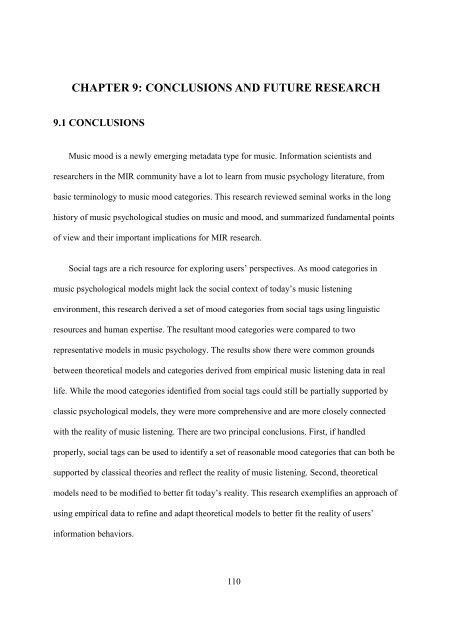improving music mood classification using lyrics, audio and social tags
improving music mood classification using lyrics, audio and social tags
improving music mood classification using lyrics, audio and social tags
You also want an ePaper? Increase the reach of your titles
YUMPU automatically turns print PDFs into web optimized ePapers that Google loves.
CHAPTER 9: CONCLUSIONS AND FUTURE RESEARCH<br />
9.1 CONCLUSIONS<br />
Music <strong>mood</strong> is a newly emerging metadata type for <strong>music</strong>. Information scientists <strong>and</strong><br />
researchers in the MIR community have a lot to learn from <strong>music</strong> psychology literature, from<br />
basic terminology to <strong>music</strong> <strong>mood</strong> categories. This research reviewed seminal works in the long<br />
history of <strong>music</strong> psychological studies on <strong>music</strong> <strong>and</strong> <strong>mood</strong>, <strong>and</strong> summarized fundamental points<br />
of view <strong>and</strong> their important implications for MIR research.<br />
Social <strong>tags</strong> are a rich resource for exploring users’ perspectives. As <strong>mood</strong> categories in<br />
<strong>music</strong> psychological models might lack the <strong>social</strong> context of today’s <strong>music</strong> listening<br />
environment, this research derived a set of <strong>mood</strong> categories from <strong>social</strong> <strong>tags</strong> <strong>using</strong> linguistic<br />
resources <strong>and</strong> human expertise. The resultant <strong>mood</strong> categories were compared to two<br />
representative models in <strong>music</strong> psychology. The results show there were common grounds<br />
between theoretical models <strong>and</strong> categories derived from empirical <strong>music</strong> listening data in real<br />
life. While the <strong>mood</strong> categories identified from <strong>social</strong> <strong>tags</strong> could still be partially supported by<br />
classic psychological models, they were more comprehensive <strong>and</strong> are more closely connected<br />
with the reality of <strong>music</strong> listening. There are two principal conclusions. First, if h<strong>and</strong>led<br />
properly, <strong>social</strong> <strong>tags</strong> can be used to identify a set of reasonable <strong>mood</strong> categories that can both be<br />
supported by classical theories <strong>and</strong> reflect the reality of <strong>music</strong> listening. Second, theoretical<br />
models need to be modified to better fit today’s reality. This research exemplifies an approach of<br />
<strong>using</strong> empirical data to refine <strong>and</strong> adapt theoretical models to better fit the reality of users’<br />
information behaviors.<br />
110
















